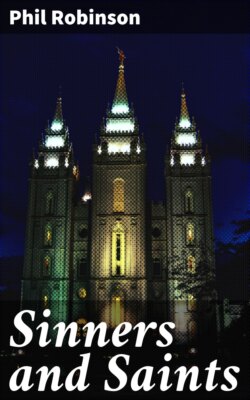Читать книгу Sinners and Saints - Phil Robinson - Страница 6
На сайте Литреса книга снята с продажи.
I.
ОглавлениеTable of Contents
It was during the Afghan War. I had just ridden back from General Roberts' camp in the Thull Valley, on the frontiers of Afghanistan, and found myself stopped on my return at the Kohat Pass. "It is the orders of Government," said the sentry: "the Pass is unsafe for travellers."
But I had to get through the Pass whether it was "safe" or not, for through it lay the only road to General Browne's camp, to which I was attached. So I dismounted, and after a great deal of palaver, partly of bribes, partly of untruths, I not only got past the native sentries, but got a guide to escort me, through the thirty miles of wild Afridi defiles that lay before me. The scenery is, I think, among the finest in the world, while, added to all is the strange fascination of the knowledge that the people who live in the Pass have cherished from generation to generation the most vindictive blood feuds. The villages are surrounded by high walls, loopholed along the top, and the huts in the inside are built against the wall, so that the roofs of them can be used by the men of the village as lounges during the day, and as ramparts for sentries during the night. Within these sullen squares each clan lives in perpetual siege. The women and children are at all times permitted to go to and fro; but for the men, woe to him who happens to stray within reach of the jezails that lie all ready loaded in the loopholes of the next village. The crops are sown and reaped by men with guns slung on their backs, and in the middle of every field stands a martello-tower, in which the peasants can take shelter if neighbours sally out to attack them while at work. Rope-ladders hang from a doorway half-way up the tower, and up this, like lizards, the men scramble, one after the other, as soon as danger threatens, draw in the ladder, and through the loop-holes overlook their menaced crops.
A wonderful country truly, and something in the air to day that makes my guide ride as hard as the road will permit, with his sword drawn across the saddle before him. My revolver is in my hand. And so we clatter along, mile after mile, through the beautiful series of little valleys, grim villages, and towers. Now and again a party of women will step aside to let us pass, or a dog start up to bark at us, but not a single man do we see. Yet I know very well that hundreds of men see us ride by, and that a jezail is lying at every loophole, and covering the very path we ride on.
We reach a sudden turn of the path; my guide gallops round it. He is hardly out of my sight when Bang! bang! It is no use pulling up, and the next instant I am round the corner too. A man, with his jezail still smoking from the last shot, starts up from the undergrowth almost under my horse's feet, and narrowly escapes being ridden down. Another man comes running down the hillside towards him. In front of me, some fifty yards off, is my guide, with his horse's head towards me and his sword in his hand, and on the path, midway between us, lies a heap of brightly-coloured clothing—a dead Afridi! For a second both guide and I thought that it was we who had drawn the fire from the ambushed men. But no, it the poor Afridi lad lying there in the path before us, and the victim of a blood feud. He had tried, no doubt, to steal across from his own village to some friendly hamlet close by, but his lynx-eyed enemies had seen him, and, lying there on either side of his path, had shot him as he passed.
But what a group we were! Myself, with my revolver in my hand, looking, horror-stricken, now at the dead, and now at his murderers; my guide, in the splendid uniform of the Indian irregular cavalry, emotionless as only Orientals can be; the two murderers talking together excitedly; in the middle of us the dead lad! But there was still another figure to be added, for suddenly, along the very path by which the victim had come, there came running an old woman—perhaps she had followed the lad with a mother's tender anxiety for his safety—and in an instant she saw the worst. Without a glance at any of us, she flung herself down with the cry of a breaking heart, by the dead boys side, and as my guide turned to ride on and I followed him, as the murderers slipped away into the undergrowth, we all heard her crooning, between her sobs, over the body of her murdered son.
